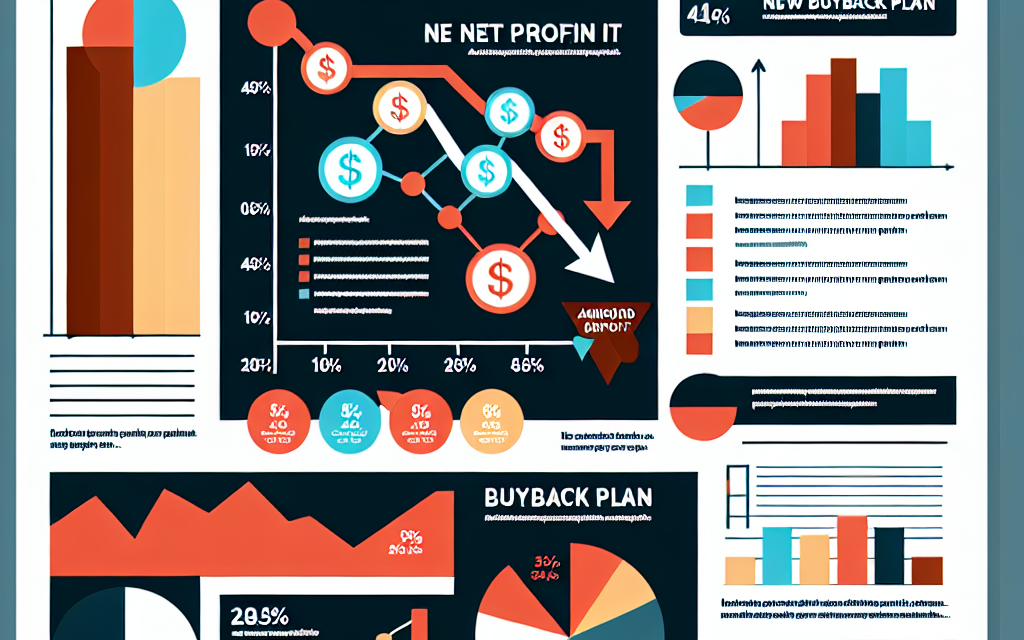“Balancing the Books: Ahold Delhaize Faces Profit Dip, Unveils Strategic Buyback Plan”
Introduction
Ahold Delhaize, a prominent global food retail group, recently reported a decline in net profit for the latest fiscal period, reflecting challenges in the current economic environment. Despite the dip in profitability, the company remains committed to enhancing shareholder value and has announced a strategic share buyback plan. This initiative underscores Ahold Delhaize’s confidence in its long-term growth prospects and its dedication to returning capital to shareholders. The buyback plan is set to bolster investor confidence and support the company’s stock performance amidst fluctuating market conditions.
Analysis Of Ahold Delhaize’s Lower Net Profit In Recent Financial Report
Ahold Delhaize, a prominent player in the global retail industry, recently reported a decline in net profit, a development that has captured the attention of investors and analysts alike. This financial outcome, while not entirely unexpected given the current economic climate, underscores the challenges faced by the company in navigating a complex and rapidly changing market environment. The decline in net profit can be attributed to several factors, including increased operational costs, competitive pressures, and fluctuating consumer demand. As the company grapples with these issues, it has also announced a strategic buyback plan, aiming to bolster shareholder confidence and stabilize its financial standing.
To begin with, the decrease in net profit is reflective of broader economic trends that have impacted many businesses worldwide. Rising inflation rates have led to increased costs for raw materials and transportation, which in turn have squeezed profit margins. Ahold Delhaize, like many of its peers, has had to contend with these rising costs while striving to maintain competitive pricing for its customers. Additionally, the retail sector has been experiencing heightened competition, with both traditional brick-and-mortar stores and online platforms vying for consumer attention. This competitive landscape has necessitated increased investment in marketing and technology, further straining the company’s financial resources.
Moreover, consumer behavior has been shifting in response to economic uncertainties and changing lifestyle preferences. There has been a noticeable trend towards more cautious spending, with consumers prioritizing essential goods over discretionary items. This shift has affected Ahold Delhaize’s sales mix, impacting revenue growth and profitability. In response, the company has been focusing on enhancing its value proposition, emphasizing quality and convenience to attract and retain customers. However, these efforts require significant investment, which has contributed to the pressure on net profit.
In light of these challenges, Ahold Delhaize’s announcement of a buyback plan is a strategic move aimed at reinforcing investor confidence. Share buybacks are often employed by companies to signal their belief in the underlying value of their stock and to return capital to shareholders. By reducing the number of shares outstanding, buybacks can also improve earnings per share, potentially leading to a more favorable perception of the company’s financial health. This initiative is likely to be well-received by investors, as it demonstrates Ahold Delhaize’s commitment to delivering value despite current headwinds.
Furthermore, the buyback plan may serve as a catalyst for future growth initiatives. By stabilizing its financial position, Ahold Delhaize can focus on strategic investments that drive long-term value creation. This includes expanding its digital capabilities, optimizing supply chain operations, and exploring new market opportunities. These efforts are crucial for maintaining competitiveness and ensuring sustainable growth in an increasingly dynamic retail landscape.
In conclusion, Ahold Delhaize’s lower net profit in its recent financial report highlights the multifaceted challenges facing the company. While rising costs and changing consumer behavior have impacted profitability, the announcement of a buyback plan reflects a proactive approach to managing these challenges. By reinforcing shareholder confidence and positioning itself for future growth, Ahold Delhaize is taking important steps to navigate the current economic environment and secure its place as a leader in the retail industry. As the company continues to adapt and innovate, it remains well-positioned to capitalize on emerging opportunities and deliver value to its stakeholders.
Understanding The Impact Of Ahold Delhaize’s Buyback Plan On Shareholders
Ahold Delhaize, a prominent player in the global retail industry, recently reported a decline in net profit, a development that has captured the attention of investors and market analysts alike. Despite this downturn, the company has simultaneously announced a share buyback plan, a strategic move that warrants a closer examination to understand its potential impact on shareholders. The juxtaposition of these two announcements raises questions about the company’s financial health and its future trajectory.
To begin with, the decline in net profit can be attributed to several factors, including increased operational costs and competitive pressures within the retail sector. These challenges are not unique to Ahold Delhaize, as many companies in the industry are grappling with similar issues. However, the company’s decision to implement a share buyback plan amidst these financial headwinds is particularly noteworthy. Share buybacks, in essence, involve a company purchasing its own shares from the marketplace, thereby reducing the number of outstanding shares. This reduction can lead to an increase in earnings per share (EPS), potentially making the stock more attractive to investors.
From a shareholder’s perspective, the buyback plan could be seen as a positive signal. It suggests that Ahold Delhaize’s management believes the company’s shares are undervalued and that investing in its own stock is a prudent use of capital. This confidence can reassure investors, particularly in times of financial uncertainty. Moreover, buybacks can provide a more tax-efficient way of returning capital to shareholders compared to dividends, as they do not incur immediate tax liabilities for investors.
However, it is crucial to consider the broader implications of this strategy. While buybacks can enhance shareholder value in the short term, they may also raise concerns about the company’s long-term investment in growth and innovation. Critics argue that funds allocated for buybacks could be better spent on initiatives that drive sustainable growth, such as expanding product lines, investing in technology, or entering new markets. Therefore, the effectiveness of Ahold Delhaize’s buyback plan will largely depend on the company’s ability to balance these competing priorities.
Furthermore, the timing of the buyback plan is significant. By announcing it alongside a report of lower net profit, Ahold Delhaize may be attempting to mitigate any negative market reactions. This strategic move could help stabilize the stock price and maintain investor confidence. Nevertheless, it is essential for shareholders to remain vigilant and assess whether the buyback is part of a broader, well-considered strategy or merely a short-term tactic to appease the market.
In conclusion, Ahold Delhaize’s decision to implement a share buyback plan amidst declining net profits presents a complex scenario for shareholders. While the buyback could enhance shareholder value and signal management’s confidence in the company’s future, it also raises questions about the allocation of resources and long-term growth strategies. As such, shareholders must carefully evaluate the potential benefits and risks associated with this move, considering both the immediate financial implications and the company’s overarching strategic objectives. Ultimately, the success of the buyback plan will hinge on Ahold Delhaize’s ability to navigate the challenges facing the retail industry while delivering sustainable value to its shareholders.
Key Factors Contributing To Ahold Delhaize’s Decline In Net Profit
Ahold Delhaize, a prominent player in the global retail industry, recently reported a decline in net profit, a development that has captured the attention of investors and market analysts alike. This decline, while concerning, is not entirely unexpected given the myriad of challenges currently facing the retail sector. Several key factors have contributed to this downturn in profitability, each playing a significant role in shaping the company’s financial landscape.
To begin with, the ongoing inflationary pressures have had a profound impact on Ahold Delhaize’s cost structure. Rising prices for raw materials, transportation, and labor have increased operational expenses, thereby squeezing profit margins. As consumers grapple with higher living costs, their purchasing power diminishes, leading to a more cautious approach to spending. This shift in consumer behavior has resulted in lower sales volumes, further exacerbating the pressure on the company’s bottom line.
In addition to inflation, supply chain disruptions have posed significant challenges for Ahold Delhaize. The global supply chain has been under strain due to a combination of factors, including the lingering effects of the COVID-19 pandemic, geopolitical tensions, and natural disasters. These disruptions have led to delays in product availability and increased costs for securing inventory. Consequently, Ahold Delhaize has faced difficulties in maintaining optimal stock levels, which has, in turn, affected sales and profitability.
Moreover, the competitive landscape in the retail sector has intensified, with both traditional and online retailers vying for market share. Ahold Delhaize has had to invest heavily in digital transformation initiatives to keep pace with evolving consumer preferences and the growing demand for online shopping options. While these investments are crucial for long-term growth, they have also contributed to short-term financial strain, impacting the company’s net profit.
Despite these challenges, Ahold Delhaize remains committed to enhancing shareholder value. In a strategic move to bolster investor confidence, the company has announced a share buyback plan. This initiative is designed to return capital to shareholders and signal management’s belief in the company’s long-term prospects. By reducing the number of outstanding shares, the buyback plan is expected to improve earnings per share, potentially offsetting some of the negative impacts of the current profit decline.
Furthermore, Ahold Delhaize is actively exploring cost-saving measures and operational efficiencies to mitigate the effects of rising expenses. The company is focusing on streamlining its supply chain operations, optimizing inventory management, and leveraging technology to enhance productivity. These efforts are aimed at improving profitability and ensuring the company’s resilience in the face of ongoing economic challenges.
In conclusion, while Ahold Delhaize’s recent decline in net profit is a cause for concern, it is important to recognize the broader context in which these results have occurred. The combination of inflationary pressures, supply chain disruptions, and increased competition has created a challenging environment for the retail sector as a whole. However, through strategic initiatives such as the share buyback plan and a focus on operational efficiencies, Ahold Delhaize is taking proactive steps to navigate these challenges and position itself for future success. As the company continues to adapt to the evolving market dynamics, its ability to execute on these strategies will be crucial in determining its long-term financial performance.
Ahold Delhaize’s Strategic Response To Financial Challenges

Ahold Delhaize, a prominent player in the global retail industry, recently reported a decline in net profit, prompting the company to unveil a strategic buyback plan aimed at bolstering shareholder confidence and addressing financial challenges. The company’s latest financial results revealed a decrease in net profit, a development that has raised concerns among investors and market analysts. However, Ahold Delhaize’s management has swiftly responded with a comprehensive strategy designed to navigate these turbulent financial waters.
The decline in net profit can be attributed to several factors, including increased operational costs and competitive pressures within the retail sector. Rising inflation and supply chain disruptions have further exacerbated these challenges, impacting the company’s bottom line. Despite these hurdles, Ahold Delhaize remains committed to maintaining its market position and delivering value to its shareholders. In response to the financial downturn, the company has announced a robust share buyback plan, signaling its confidence in the long-term prospects of the business.
The buyback plan, which involves repurchasing a significant number of shares, is intended to enhance shareholder value by reducing the number of outstanding shares and thereby increasing earnings per share. This move is often perceived as a positive signal by the market, as it demonstrates the company’s belief in its intrinsic value and future growth potential. Moreover, the buyback plan is expected to provide a cushion against market volatility, offering reassurance to investors during uncertain times.
In addition to the buyback initiative, Ahold Delhaize is also focusing on operational efficiencies and cost-saving measures to mitigate the impact of rising expenses. The company is leveraging technology and data analytics to streamline its supply chain operations, optimize inventory management, and improve customer experience. By investing in digital transformation, Ahold Delhaize aims to enhance its competitive edge and drive sustainable growth in the long run.
Furthermore, the company is exploring strategic partnerships and acquisitions to expand its market presence and diversify its revenue streams. By aligning with complementary businesses and exploring new markets, Ahold Delhaize seeks to capitalize on emerging opportunities and strengthen its position in the global retail landscape. This proactive approach underscores the company’s commitment to innovation and adaptability in the face of evolving market dynamics.
While the current financial challenges pose significant obstacles, Ahold Delhaize’s strategic response reflects a well-considered plan to navigate these difficulties and emerge stronger. The combination of a share buyback program, operational improvements, and strategic expansion initiatives demonstrates the company’s resilience and determination to deliver value to its stakeholders.
In conclusion, Ahold Delhaize’s recent financial performance has prompted a strategic response aimed at addressing the challenges posed by a complex and competitive retail environment. Through a combination of share buybacks, operational efficiencies, and strategic growth initiatives, the company is positioning itself to overcome current obstacles and capitalize on future opportunities. As Ahold Delhaize continues to adapt to changing market conditions, its commitment to innovation and shareholder value remains unwavering, offering a promising outlook for the company’s future trajectory.
Market Reactions To Ahold Delhaize’s Financial Performance And Buyback Announcement
Ahold Delhaize, a prominent player in the global retail sector, recently reported a decline in its net profit, a development that has captured the attention of market analysts and investors alike. The company’s financial performance, which fell short of expectations, has prompted a range of reactions from stakeholders, reflecting both concern and cautious optimism. Despite the dip in net profit, Ahold Delhaize has announced a strategic share buyback plan, a move that has further fueled discussions about the company’s future trajectory and its potential impact on shareholder value.
The decline in net profit can be attributed to several factors, including increased operational costs and competitive pressures within the retail industry. Rising inflation and supply chain disruptions have also played a significant role in squeezing profit margins, as the company grapples with higher costs for goods and logistics. These challenges are not unique to Ahold Delhaize, as many retailers worldwide are navigating similar headwinds. However, the company’s ability to adapt to these conditions and implement effective cost-control measures will be crucial in determining its financial resilience moving forward.
In response to the lower net profit, Ahold Delhaize’s announcement of a share buyback plan has been met with mixed reactions. On one hand, the buyback is seen as a positive signal, indicating the company’s confidence in its long-term growth prospects and its commitment to returning value to shareholders. By reducing the number of outstanding shares, the buyback could potentially enhance earnings per share and provide a boost to the stock price, offering some reassurance to investors concerned about the recent profit decline.
On the other hand, some market observers have expressed skepticism about the timing of the buyback, questioning whether the funds allocated for this purpose might be better invested in initiatives aimed at driving growth and improving operational efficiency. Critics argue that, in the face of ongoing economic uncertainties, Ahold Delhaize should prioritize strengthening its core business and exploring opportunities for innovation and expansion. This perspective underscores the delicate balance that companies must strike between rewarding shareholders and investing in future growth.
As the market digests Ahold Delhaize’s financial results and strategic plans, the company’s stock has experienced fluctuations, reflecting the broader sentiment among investors. The initial reaction to the profit decline was a dip in share price, as market participants recalibrated their expectations. However, the subsequent announcement of the buyback plan has provided some support, with the potential for stabilizing the stock in the near term. This dynamic highlights the complex interplay between financial performance, strategic decisions, and investor sentiment.
Looking ahead, Ahold Delhaize faces the challenge of navigating an evolving retail landscape marked by digital transformation and changing consumer preferences. The company’s ability to leverage technology, enhance its e-commerce capabilities, and deliver a seamless omnichannel experience will be critical in maintaining its competitive edge. Furthermore, as sustainability becomes an increasingly important consideration for consumers and investors alike, Ahold Delhaize’s commitment to environmental and social responsibility will play a pivotal role in shaping its brand reputation and long-term success.
In conclusion, Ahold Delhaize’s recent financial performance and buyback announcement have elicited a range of reactions from the market, reflecting both the challenges and opportunities that lie ahead. While the decline in net profit presents immediate concerns, the strategic buyback plan offers a potential pathway for enhancing shareholder value. As the company navigates this complex landscape, its ability to adapt and innovate will be key determinants of its future performance and market standing.
Comparing Ahold Delhaize’s Financial Results With Industry Peers
Ahold Delhaize, a prominent player in the global retail industry, recently reported a decline in net profit, a development that has captured the attention of investors and analysts alike. This financial outcome, while concerning, is not entirely unexpected given the current economic climate and the challenges faced by the retail sector as a whole. To better understand Ahold Delhaize’s performance, it is essential to compare its financial results with those of its industry peers, providing a broader context for the company’s recent announcement of a share buyback plan.
In the latest financial quarter, Ahold Delhaize reported a decrease in net profit, a trend that has been observed across several major retailers. This decline can be attributed to a variety of factors, including rising operational costs, supply chain disruptions, and shifts in consumer behavior. These challenges have been exacerbated by the lingering effects of the COVID-19 pandemic, which has fundamentally altered the retail landscape. Despite these hurdles, Ahold Delhaize has managed to maintain a stable revenue stream, demonstrating resilience in a volatile market.
When comparing Ahold Delhaize’s performance to its industry peers, it becomes evident that the company is not alone in facing financial headwinds. Many retailers have reported similar declines in profitability, underscoring the widespread impact of current economic conditions. For instance, other major players in the sector have also experienced pressure on their margins due to increased costs and competitive pricing strategies. This trend highlights the importance of strategic management and operational efficiency in navigating the complexities of the retail environment.
In response to these challenges, Ahold Delhaize has announced a share buyback plan, a move that signals confidence in its long-term growth prospects. This decision is aimed at enhancing shareholder value and reflects the company’s commitment to returning capital to its investors. By repurchasing shares, Ahold Delhaize seeks to bolster its stock price and provide a cushion against market volatility. This strategy is not uncommon among retailers facing similar financial pressures, as it can serve as a means to stabilize investor sentiment and demonstrate financial prudence.
Furthermore, the share buyback plan can be seen as a strategic maneuver to optimize the company’s capital structure. By reducing the number of outstanding shares, Ahold Delhaize can potentially improve its earnings per share, making it a more attractive investment option. This approach aligns with the actions of other industry leaders who have implemented similar measures to strengthen their financial positions amidst challenging market conditions.
In conclusion, while Ahold Delhaize’s lower net profit may raise concerns, it is important to view this development within the broader context of the retail industry. The company’s performance is reflective of the challenges faced by many of its peers, highlighting the need for strategic adaptation and resilience. The announcement of a share buyback plan underscores Ahold Delhaize’s commitment to its shareholders and its confidence in future growth. As the retail sector continues to evolve, companies like Ahold Delhaize must remain agile and proactive in addressing the complexities of the market, ensuring their long-term success and sustainability.
Future Outlook For Ahold Delhaize Amidst Financial Adjustments And Buyback Plan
Ahold Delhaize, a prominent player in the global retail sector, recently reported a decline in net profit, a development that has captured the attention of investors and market analysts alike. Despite this setback, the company has simultaneously announced a strategic share buyback plan, signaling its commitment to enhancing shareholder value and maintaining financial stability. This dual announcement presents a complex picture of Ahold Delhaize’s current financial health and its future outlook.
The decline in net profit can be attributed to several factors, including increased operational costs and competitive pressures within the retail industry. Rising inflation and supply chain disruptions have further exacerbated these challenges, impacting the company’s bottom line. However, Ahold Delhaize has demonstrated resilience in navigating these turbulent times by implementing cost-saving measures and optimizing its supply chain operations. These efforts, while not immediately reflected in the net profit figures, are expected to yield positive results in the long term.
In light of the lower net profit, the announcement of a share buyback plan may seem counterintuitive at first glance. However, this strategic move underscores Ahold Delhaize’s confidence in its underlying business fundamentals and its commitment to returning value to shareholders. By repurchasing shares, the company aims to reduce the number of outstanding shares, thereby increasing the value of remaining shares and boosting earnings per share. This approach is often viewed favorably by investors, as it reflects management’s belief in the company’s future growth prospects.
Moreover, the buyback plan is indicative of Ahold Delhaize’s robust cash flow position, which enables it to undertake such initiatives even amidst financial adjustments. The company has consistently generated strong cash flows from its operations, providing it with the flexibility to invest in growth opportunities while simultaneously rewarding shareholders. This financial strength is a testament to Ahold Delhaize’s prudent management and its ability to adapt to changing market dynamics.
Looking ahead, Ahold Delhaize’s future outlook appears cautiously optimistic. The company is well-positioned to capitalize on emerging trends in the retail sector, such as the growing demand for online grocery shopping and the increasing focus on sustainability. By leveraging its extensive network of stores and digital platforms, Ahold Delhaize is poised to capture a larger share of the evolving consumer landscape. Additionally, the company’s commitment to sustainability initiatives aligns with the broader industry shift towards environmentally responsible practices, further enhancing its competitive edge.
In conclusion, while Ahold Delhaize’s recent financial performance may have raised concerns, the company’s strategic initiatives, including the share buyback plan, highlight its proactive approach to addressing challenges and seizing opportunities. The combination of cost-saving measures, strong cash flow management, and a focus on future growth drivers positions Ahold Delhaize favorably for the coming years. As the retail landscape continues to evolve, the company’s ability to adapt and innovate will be crucial in sustaining its market leadership and delivering long-term value to shareholders. Thus, despite the current financial adjustments, Ahold Delhaize remains a formidable force in the retail industry, with a promising future outlook.
Q&A
1. **What was Ahold Delhaize’s reported net profit?**
Ahold Delhaize reported a lower net profit compared to the previous period.
2. **What financial strategy did Ahold Delhaize announce?**
Ahold Delhaize announced a share buyback plan.
3. **What is the purpose of a share buyback plan?**
A share buyback plan is typically used to return capital to shareholders and can help increase the value of remaining shares.
4. **How did Ahold Delhaize’s revenue perform?**
The report did not specify, but the focus was on the lower net profit and the buyback plan.
5. **What might be a reason for the lower net profit?**
Possible reasons could include increased costs, lower sales, or other financial challenges.
6. **How did the market react to the announcement?**
The market reaction would depend on investor sentiment, but buyback plans often lead to positive reactions.
7. **What is Ahold Delhaize’s industry?**
Ahold Delhaize operates in the retail and grocery industry.
Conclusion
Ahold Delhaize’s recent financial report indicates a decline in net profit, which may raise concerns about the company’s operational efficiency and market conditions impacting its profitability. However, the announcement of a buyback plan suggests that the company is confident in its long-term value and is committed to returning capital to shareholders. This strategic move could potentially bolster investor confidence and support the stock price, despite the current dip in profits. Overall, while the lower net profit highlights challenges, the buyback plan reflects a proactive approach to managing shareholder value.





